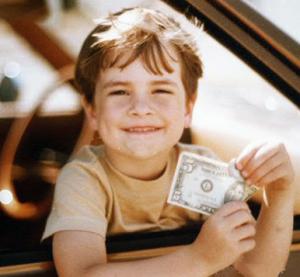Teaching Kids About Purchasing Power
When I was young, my mother was a poor single mom. She didn't make much, so we never had much. Of course, this never bothered my brother, sister or me; we never knew we were poor. What we did know was this: money has a great power. A purchasing power. An amazing ability to buy either a large quantity of things or one item. How did we know this at seven-, six- and three-years old? Why, our mother taught us. Today I'll let you in on her secrets to teaching kids about purchasing power.
Take Every Opportunity
Every time we went to any store, my mother would show us how to shop. This was actually rather simple. She made buying things more of a game than a chore (and to this day, I still love to grocery shop!). Anyway, Mom would challenge my older brother and me to find the best price on a box of cereal, and we would run amuck in the cereal aisle until we both raced back to her, our choices in hand. She would praise us both and then explain whose choice was better.
Another time period in which she explained purchasing power was during school clothes shopping. When we were older (and the family had more money), she would give us each $50 to shop for school clothes. Then she explained that we could spend it as we pleased, either for a few new items at a department store or for a plethora of goods at a thrift store. You can guess what I chose purchase – even as a child, I was thrifty!
Other opportunities abounded as well: using coupons, timing sales, determining price per pound or ounce, choosing to purchase pre-made items or ingredients, etc. The trick to my mother's madness was to take any opportunity to teach us about money and purchasing power.
Talk in Your Child's Language
Of course, children of different ages learn concepts at differing paces. Your three-year old may not quite grasp the difference between labeled prices on the store shelves, but if you ask her which costs more, a one-dollar box or a two-dollar box of cereal, she may be able to answer correctly. Here are some other concepts that may be appropriate by age:
- One- to three-years old: Money is foreign at these ages, so introducing kids to basics like helping you hand the cashier money can help build a basis for the worth of cash.
- Four- to six-years old: At these ages, kids begin to understand the value of money, and they can help you determine if two dollars is worth more than one.
- Seven- to nine-years old: Kids in this age range can have more fun "helping" you shop by grabbing the best-priced item off the shelf or matching coupons to products to help determine if a name brand with coupon is a better deal than a generic brand.
- Ten- to twelve-years old: These tween years may be lost on the grocery store, but kids might take more of an interest in using their own money to find the best deal on games and toys.
- Teen years: As children enter their teens, clothing is often a way to express themselves, and helping them to understand the concepts of sales, coupons and thrift-store shopping may keep their interest longer.
Overall, as you teach your child about purchasing power, using some tricks and talking in the child's language can help your kid learn quickly and enthusiastically. From there, he can determine how best to spend his own money, helping him buy future goods in the best way possible.
- Login to post comments
-







Invest It Wisely wrote:
Sat, 02/04/2012 - 01:45 Comment #: 1I think it is very important to teach kids about personal finance and the value of money, even from a young age. I think you can even advance this up a bit -- give them some opportunities to practice budgeting, saving, and entrepreneurialism even from a pre-teen age!
Weekend Carnival: A New Beginning | Invest It Wisely wrote:
Sat, 02/04/2012 - 09:49 Comment #: 2[...] do you teach your kid about the purchasing power of money? Christa Palm at MomVesting has some [...]
Lindy Mint wrote:
Sat, 02/04/2012 - 16:55 Comment #: 3I love your mom's grocery store game. That's a great idea.
We've been working hard on our oldest son (age 7) to teach him about money. He was the first born son and grandson on both sides of our family, so he was showered with everything he ever wanted from a very early age. We're using an allowance to make him save up for what he wants now, and he's starting to get it. But we still have a long way to go!
Miss T @ Prairie Eco-Thrifter wrote:
Mon, 02/06/2012 - 18:58 Comment #: 4This is so important. I like your practical techniques and how they are sorted by age. We don't have kids yet but I will definitely keep this in mind.
Christa Palm wrote:
Wed, 02/08/2012 - 16:23 Comment #: 5Invest it Wisely, very good idea! Lemonade stands, shoveling snow and other entrepreneurial opportunities are great learning experiences for kids.
Lindy Mint, it's great that your son is learning about money. Allowance is definitely helpful!
Miss T, thank you!